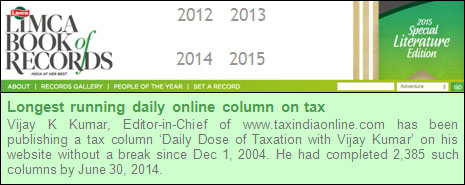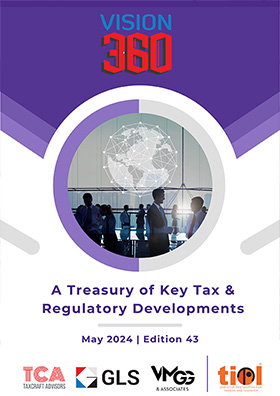
TIOL-DDT 2785
12 02 2016
Friday
THE CBEC in its latest Circular on SVB states:
The 'Special Valuation Branch' ("SVB") was created as an institution specializing in investigation of transactions involving special relationships between buyer - seller or those involving other special circumstances surrounding the sale of imported goods, both of which have a bearing on the assessable value. Detailed instructions were issued vide Circular Nos. 1/98 - Customs dated 1.1.98 and 11/2001 -Customs dated 23.2.2001, prescribing the procedure to be observed by the Custom Houses for referring cases to Special Valuation Branches and time lines to be followed for finalising such cases.
However, trade and industry has been repeatedly representing regarding delays in finalisation of SVB investigations, continued uncertainty due to provisional assessments, increase in transaction costs due to extra duty deposits and burdensome procedure of renewal of SVB orders. Board has also taken cognizance of the WCO's Guide to Customs Valuation and Transfer Pricing (June 2015) and the fact that the circulars 1/98 and 11/2001 were based upon the Customs Valuation (Determination of Price of imported goods), Rules, 1988, which have since been superseded by the Customs Valuation (Determination of Value of Imported Goods) Rules, 2007. Accordingly, after considering the above and the large number of SVB investigations pending in various Customs Houses, a need has been felt to streamline the procedures relating to investigations by SVBs.
The monster that SVB has grown into in the recent years can be gauged from the titles of some of the articles we carried on the subject.
1. Special Valuation Branch in Customs - The Great Indian Customs Loot!!
2. Transfer Pricing: North Block stands 'sensitised'; Now needs to dismantle SVB in Customs
3. SVB & valuation of Goods Imported From Related Party
4. TARC recommendations - 'Beginning of end' for SVB?
5. Irrelevance of Special Valuation Branch in Customs
6. An illegal 'nonsense' called Special Valuation Branch!
The reformist measures of the Board are:
1. Director General of Valuation (DGOV) no more the boss: With effect from 1.1.2013, the DGOV was vested with the functional control over SVBs. Now the SVBs are given back to the Commissionerates.
2. The dreaded Extra Duty Deposit (EDD): 'Extra Duty Deposit' @ 1% of declared assessable value is being obtained from the importer for a period of 4 months during which time he is required to submit required documents and information to the SVB. In the event of his failing to do so, the EDD can be increased to 5% till such time the importer complies. Board has decided that while reference to SVB requires the assessments to be provisional, for the sake of reducing transaction cost and bringing uniformity across Customs Houses, no security in the form of EDD shall be obtained from the importers. However, if the importer fails to provide documents and information required for SVB inquiries, within 60 days of such requisition, security deposit at a rate of 5% of the declared assessable value shall be imposed by the Commissioner for a period not exceeding the next three months.
3. No appealable order by SVB: It has also been decided that the existing system of adjudication, wherein the proper officer of the SVB passed an appealable order followed by the assessing officer passing another corresponding order finalizing provisional assessments should be replaced. It has now been decided that the SVB shall not issue an appealable order. Instead, the SVB shall convey its investigative findings by way of an Investigation Report to the referring customs formation for finalizing the provisional assessments. This would obviate multiple streams of appeals for the trade.
4. No SVB: No inquiries by SVB in cases of import of samples, where duty chargeable is nil or any transaction where the value of imported goods is less than Rs 1 lac but cumulatively these transactions do not exceed Rs 25 lacs in any financial year.
Board has also prescribed the procedure for referring a case to SVB and how it is to be dealt with in SVB.
CBEC Circular No. 5/2016 - Customs; Dated: February 09 2016
SVB - Pending Cases - Board Instructions
THE good Board wants to extend its magnanimity to pending cases too.
1. All pending SVB investigations, where Extra Duty Deposit is being obtained are required to be reviewed. In cases, where the importer has provided information & documents, requisitioned by the SVB, EDD shall be discontinued forthwith. This exercise shall be completed by 31st May 2016.
2. In cases, where EDD has been enhanced to 5%, due to the importer not having provided information or documents necessary for SVB inquiries, the Commissioner shall immediately take recourse to appropriate provisions under the Customs Act for obtaining the necessary documents for investigations and subsequently dispense with the EDD.
3. Chief Commissioners / Principal Commissioners /Commissioners having jurisdiction over the existing SVB at Bangalore, Chennai, Delhi, Kolkata, and Mumbai shall draw up an action plan for completing investigations in all pending cases forthwith. Where required, additional officers may be deputed to complete pending investigations. Pendency should be brought down by 10% in each month so that all existing cases (commenced upto 31.12.2015) are disposed of latest by 31.10.2016.
An end to a draconian era?
CBEC Circular No. 4/2016 - Customs; Dated: February 09 2016
FTP - Procedure for export of sesame seeds to European Union countries - Deferment of implementation
BY Notification No. 37/2015-20 dated 03.02.2016, the Government had notified the conditions for export of sesame seeds to European Union with immediate effect .
Now the implementation is postponed till 10.3.2016.
DGFT Notification No. 39/2015-2020, Dated: February 11, 2016
High Court Doesn't grant Stay in Department's Appeal against CESTAT Order - Commissioner((A) does
HERE is an interesting case in which a Commissioner (Appeals) indirectly stayed an order of the CESTAT which the High Court refused to stay.
The assessee had won in the Tribunal. The Department went in appeal to the High Court. The High Court admitted the appeal but refused to stay the Tribunal's order. In the meanwhile, the assessee claimed refund of the excess duty paid, which was rejected by the Assistant Commissioner. On appeal, the Commissioner (Appeals) decided not to decide the case as the department's appeal was pending in the High Court.
The assessee approached the High Court. The High Court observed:
When the High Court has refused to grant stay against the judgment of the Tribunal, the Commissioner cannot indirectly ensure such stay by refusing to process and decide the appeals of the petitioners. This is precisely what the Commissioner has done in the present case. Refusal to decide the appeals on the ground that the Department's appeals are pending before the High Court would tantamount to ensuring stay against implementation of the decision of the Tribunal, which the High Court refused to grant.
The action of the Commissioner in keeping the appeal against the order of the adjudicating authority refusing to grant refund would be an indirect attempt to deny the benefit to the petitioner flowing from such judgment of the Tribunal when the High Court refused to grant protection. The Commissioner by way of indirect method cannot bestow the same unto himself.
Doesn't this senior IRS officer know that when High Court has refused to stay the CESTAT order, that order is binding on the learned Commissioner?
Imagine a situation where the CESTAT order was against the assessee and the assessee had gone to the High Court and the High Court had not granted stay. The learned Commissioner would have said "mere pendency of the appeal in the High Court is no valid ground to allow the appeal of the assessee. As of now, the Tribunal's order rules the field."
Should you teach principles of adjudication to a Commissioner? We bring you the High Court order today. Please see Breaking News.
While on this, DDT would like to draw your attention to an important decision of the Hyderabad Bench of the CESTAT.
In a particular case, the Tribunal had ruled in favour of the assessee. The Department appealed to the High Court. The High Court upheld the Tribunal's order. The Department filed an SLP in the Supreme Court. The Supreme Court did not stay the order of the High Court but asked the assessee to submit bank guarantee for half the duty.
When an identical case reached the Hyderabad Bench of the Tribunal, the Tribunal observed,
In this background, the order passed by the Tribunal which was confirmed by the Hon'ble High Court of Gujarat is binding even though the appeal is pending before the Hon'ble Apex Court .
In obedience to judicial discipline, the Tribunal followed the High Court judgement.
Please see 2016-TIOL-296-CESTAT-HYD.
Revamped Special Valuation Branch guidelines... Better late than never!!!
AND for a more detailed analysis of the SVB story, here is an article written by Suresh Nair, Partner in EY. In November 2014, we had carried his article, TARC recommendations - 'Beginning of end' for SVB?
The Tax Administrative Reforms Committee (TARC) in its second report had identified and highlighted the challenges with the present Special Valuation Branch (SVB) process including
++ "Gate keeper" approach and the traditional control mechanisms.
++ Huge pendency in SVB cases and quality of decisions.
++ Requirement of extra duty deposit (EDD).
++ Increase of EDD from 1% to 5% at slightest delay on the part of the importers in providing documents/details.
++ Resistance of Customs to discontinue the EDD on furnishing of required documents/details despite specific mention in relevant Circular.
The Committee had recommended that related party transactions be handled through the post-clearance audit mechanism thereby suggesting discontinuation of the said SVB mechanism.
 Well, CBEC has taken note of the above. After almost 15 years, we now have two new back to back Circulars (Circular No 4 and 5, both dated 9 February 2016) which would potentially trigger a completely different approach to the functioning of SVB. Well, CBEC has taken note of the above. After almost 15 years, we now have two new back to back Circulars (Circular No 4 and 5, both dated 9 February 2016) which would potentially trigger a completely different approach to the functioning of SVB.
One major relief is that, going forward, no EDD payment is required for related party transactions if all documents required for SVB investigations are submitted within 60 days from the date on which the assessing officer at the port of import calls for the relevant information.
If the information is not submitted with the said period, Security Deposit @ 5% (either in Cash or Bank Guarantee) of declared assessable value would be imposed by the Commissioner for a period not exceeding 3 months. Industry would hope that the Department follows the Circular strictly which should then be beneficial as compared to the current practise followed.
For imports through ports under the jurisdiction of Mumbai/Delhi/Chennai/Kolkata/ Bangalore Custom House, the importer would be free to approach the SVB of the Customs House of import or the Customs House most proximate to their corporate office.
The Circular also provides the option to the proper officer at the Customs station of import to finalise the assessment basis enquiries or to refer the matter to the SVB. Typically, the investigations by SVB are required to be completed within 2 months from receipt of required information, extendable by approval of Commissioner/Chief Commissioner. Import of samples, prototypes, nil rated/unconditionally exempted goods and goods with lower than stipulated value are not to be referred to SVB which is a positive move.
Another relevant change is that the concept of “SVB Order” has been put to rest. Pursuant to scrutiny of information / documents submitted, the SVB office would going forward issue an Investigation Report (IR) to the Customs assessing officers at the port of Import who would finalise the provisional assessments accordingly. In case the IR proposes that declared value has been influenced due to related party relationship, then a show cause notice would be issued to the importer before finalising the provisional assessment.
A detailed procedure for speedy disposal of cases currently pending with the SVB for renewal has also been conceptualised. “One time Declaration” would need to be submitted on the letter head of the importer to the SVB office and formats of the same have been provided in the said Circular no. 4. The Declarations are largely aligned to the Affidavits that the importers file at the time of applying for renewal of SVB Orders. Even in case where there are changes in the terms and conditions or circumstances relating to the sale of goods / new agreement / change in royalty payment etc , the “One Time Declaration” would need to be submitted. Two specific formats (one for change and one for cases where there is no change) have been provided for to meet the requirements of the importer.
For import transactions where there is no change in the circumstances surrounding the import transactions and valuation thereof (i.e for importers who file the “One Time Declaration” in Annexure 1), the process of renewal would be treated as dispensed with and Extra Duty Deposit (EDD) would be discontinued immediately. This should be a big relief to the related party importers with SVB renewals pending for a long time and yet bearing the brunt of 1% EDD.
There is also a specific reference of discontinuing EDD in all cases where SVB is pending investigations (other than renewal cases also) if the importer has provided information and documents as called for by the SVB. A time line of 31 May 2016 has been specified for this purpose to enable the SVB office to carry out its due diligence.
SVB is now back under the functional control of the jurisdictional Commissionerate. The Director General of Valuation has now been relieved of this function while they would continue to monitor the quality of investigation report of the SVB and also support the SVB by way of issuance of guidance notes.
Before Parting:
Hopefully, both the Circulars would go a long way in bringing a smile back on the Importers who have struggled to get their SVB files cleared from the Department. As they say, ‘the proof of the pudding would be in eating” and Industry would expect that the Department ensures strict compliance to the guidelines mentioned in the said Circulars, which would make the long 15 year wait worth it at the end of the day. This should also importantly address the ‘Ease of Business' agenda of the Government !!!
Until Monday with more DDT
Have a nice weekend.
Mail your comments to vijaywrite@tiol.in |









 Download PDF
Download PDF
 Well, CBEC has taken note of the above. After almost 15 years, we now have two new back to back Circulars (Circular No 4 and 5, both dated 9 February 2016) which would potentially trigger a completely different approach to the functioning of SVB.
Well, CBEC has taken note of the above. After almost 15 years, we now have two new back to back Circulars (Circular No 4 and 5, both dated 9 February 2016) which would potentially trigger a completely different approach to the functioning of SVB. 



